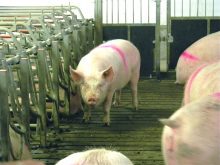Symbolic vote:Amid pressure to cut yawning U.S. deficit and debt, the Senate voted overwhelmingly late last week to immediately repeal subsidies for the ethanol industry, first won in 1978, that now cost tax payers about $6 billion a year.
The Senate’s vote was mostly symbolic, as it was attached to a bill that does not have companion legislation in the House of Representatives.
Senator Diane Feinstein, the sponsor of the bill, is working with other senators on a compromise measure, that would phase down subsidies for ethanol, rather than cut them altogether.
Read Also

Mazergroup’s Bob Mazer dies
Mazergroup’s Bob Mazer, who helped grow his family’s company into a string of farm equipment dealerships and the main dealer for New Holland machinery in Saskatchewan and Manitoba, died July 6 from cancer.
Chew on that:Biofuels produce
jobs, not hunger, U.S. Agriculture Secretary Tom Vilsack said June 20 ahead of a global meeting where the farm-grown fuels may be criticized as a factor in high food prices. Vilsack said biofuels’ role in price spikes is small and the fuels boost farm income and spark rural growth. “This is a tremendous job creator,” he said.
International charity Oxfam said, G20 nations should scrap “damaging” biofuel subsidies and mandates on the grounds that they add to price volatility and global warming.
shortie, new crop PROs,
The Canadian Wheat Board projected mostly lower new-crop wheat values June 23 for the upcoming 2011-2012 (Aug/July) marketing Wheat values ranged from $7 per tonne lower to up $2. Barley prices were unchanged. Durum values were up $79 per tonne for the top three milling grades. The board said world wheat production prospects stabilized, especially in European Union, but not in flooded Western Canada and U.S. northern Plains. The board said it has priced about five per cent of the expected wheat crop.
New GM rules:The European
Union adopted new rules June 24 allowing traces of unapproved genetically modified (GM) material in animal feed imports, in a bid to secure grain fodder supplies to the import-dependent bloc. The 0.1 per cent threshold will only apply to imports of animal feed and not human food, despite warnings from traders and exporting states that it is impractical and costly to separate global grain supplies.
The EU currently imports some 45 million tonnes of protein crops a year, much of it soy beans and soy meal destined for use as animal feed.
Flood assistance sought:
The National Farmers Union is calling for a multi-million financial assistance package for flooded Manitoba and Saskatchewan beef producers. The NFU wants flood-stricken cattle farmers to receive per-head payments of $150 to help offset losses resulting from flooded pastures and hayfields. The organization is also asking for a registry to connect cattle producers with potential greenfeed growers. The NFU appeal comes on the eve of a federal-provincial flood assistance package expected this week. – Staff
DU offers haylands:
Ducks Unlimited Canada (DUC) is offering haying opportunities to livestock producers impacted by severe flooding of farm lands in parts of Manitoba through a Flood Relief Forage Program.
DUC usually offers over 3,000 acres to Manitoba producers for haying but this year more acres will be made available. DUC will be tendering hayland in June for a July 21 access date. The tendering information will be available online at yourland.ducks.ca or call Robin Hamilton at (204) 729-3513. – Staff
High prices to stay:The newly
elected chief of the United Nations food agency says he expects high food prices to last several years and cause problems for importing countries.
“This is not only a temporary imbalance,” Director-General Elect Jose Graziano da Silva told a news conference.
“This is related to financial markets and until we reach a more stable financial situation worldwide, commodities prices will reflect that,” he said.
Graziano da Silva was elected head of the Food and Agriculture Organisation (FAO) on June 26, replacing Senegal’s Jacques Diouf.
U.S. drought deepens:
Sweltering summer heat and a persistent lack of rain have deepened an historic drought gripping Texas and surrounding U.S. southern states. And despite heavy rains and flooding to the north, there is little relief in sight for the South. The “Drought Monitor” report from a consortium of national climate experts said that over the last week, the worst level of drought, called “exceptional drought,” expanded to cover more than 70 per cent of Texas. In Arizona, it expanded to 70 per cent, Louisiana to 65 per cent and Oklahoma to a third of its land.
Feed barley final payment:
The Canadian Wheat Board (CWB) will send farmers a final payment of $36.39 per tonne for the feed barley they delivered to Pool A during the 2010-11 crop year. Farmers will receive payment by direct deposit on July 4. Cheques will be delivered for mailing to Canada Post by July 7. The Pool A feed barley pool ran from Aug. 1, 2010 to Jan. 31, 2011. This final payment represents the balance of the money owing to farmers after their feed barley has been marketed through the CWB, and after operating costs have been deducted. – Staff


















